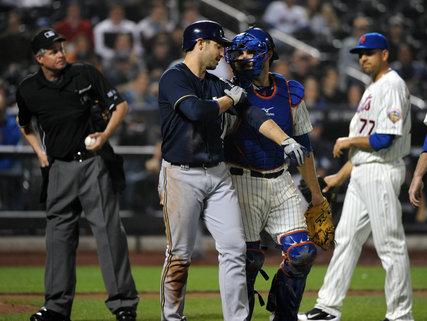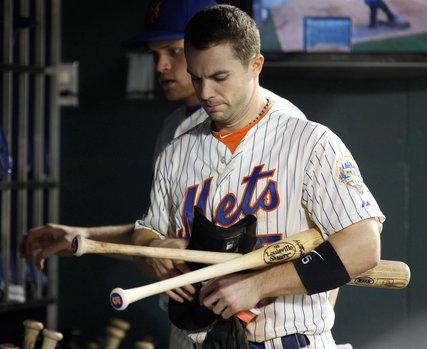Taking One for the Team. Or Not.
The New York Times
May 23, 2012
By Doug Glanville
The Mets were getting thrashed by the Milwaukee Brewers. In the late innings, the Brewers’ second baseman, Rickie Weeks, hit a “salt in the wound” home run to make the score 8-0. Then the Mets pitcher, D.J. Carrasco, hit the next batter, Ryan Braun, the Brewers’ star and reigning National League M.V.P., in the back.
As we know, the unwritten rules of baseball came into play right after Carrasco hit Braun, for no clear reason other than frustration. These tenets were unwritten over time by the mysterious hands of experience; occasionally they seem like the code of the Neanderthal, occasionally like a code that keeps the game in check. But they could have just as easily been written by Hammurabi. An eye for an eye.
Collins saw the writing on the wall even though it was written in invisible ink. Wright was scheduled to hit and if the Brewers were going to retaliate, they would choose him. A balanced equation: a star for a star.
Collins pre-empted this possibility by yanking Wright. Two batters later, he subbed for his next best player, Murphy. In his press conference after the game, Collins said, “They are not hitting my guy tonight.”
Only problem was that Wright took offense at his manager’s gesture. It was at this time that Collins realized he had tucked his son into his crib, kissed him softly on the cheek, and felt a beard.
Collins’s thinking took something away from Wright: the chance to show that he has become the leader the Mets have wanted him to be since he broke into the league in 2004.
The players know these unwritten rules as well as the managers. They know how to dish it out and how to be on the receiving end. And Wright understood that it was likely he would get hit. He also surely remembered that once before when he had been hit (unintentionally) it had resulted in a concussion and some time on the shelf. Still, he knew that in order to be there for his team, he had to step into that batter’s box.
Collins didn’t let him do that.
It is easy to understand the manager’s thought process: I have a star player, he was knocked out by a pitch in the past, I’m not going to waltz him into harm’s way in a game we’re most likely going to lose big anyway. I didn’t even want our pitcher to hit their star player in the first place. Logic suggests that I put someone less crucial to the team in that box, because if he gets hit, he is replaceable; more likely, they won’t even bother.
The problem is, there is no statute of limitations in the unwritten-rule book. If a team is beyond angered by another team’s act, they will record it and wait as long as it takes to even the score. You cannot put someone in a glass case in baseball, because the game will find you — soon, tomorrow, or in five years. My former teammate Jose Mesa was miffed when his former teammate Omar Vizquel wrote a book in which he intimated that Mesa choked in the 1997 World Series. Mesa vowed, “If I face him 10 more times, I’ll hit him 10 times.” He was well on his way to 10 at the time of his retirement.
Silly? Maybe, but this is how intimidation and score-settling are meted out, and players accept the fact and know how to work within its framework. Riots don’t occur, people don’t carry knives into parking lots the next day, rarely does it ever spill out of control because everyone knows how to handle it on the field.
So what was Collins protecting against? Injury? If the Brewers were mad enough, they could get Wright any number of ways. Besides, it could be more injurious to his team’s morale that Collins was openly choosing who was valuable enough to protect and who qualified as a sacrificial lamb.
If Wright had approached Collins beforehand and said, Hey, coach, I think they are going to hit me right here, can you take me out?, his teammates would have banished him to Chicken Island. He would have lost the respect of his entire organization and his fans. He had to get in that batter’s box. By taking him out, Collins took away Wright’s power to make that choice. Wright was clearly upset about it (which garnered respect from his teammates and fans alike), just as the son is mad that his father won’t let him drive the car at night.
His reaction gave the manager pause, raising the question: would Collins have been the equivalent of a negligent parent if he had allowed Wright to walk out there? Maybe some would say yes, but at a certain point you have to let your son make his own decisions and deal with the consequences. If Wright got hurt, that wouldn’t be good. But sometimes a team needs to find out how it can perform without its best player. Who will step up? Albert Pujols, one of the greatest hitters of all time, left St. Louis … and the Cardinals found out that they might actually be better without him.
You cannot keep your son away from risk forever. Life, or the game, will eventually knock on his door on a day when you can’t be there. In baseball, there are 162 games a year or more, and in this case, the Mets play the Brewers again in September. If they want a piece of Wright they will find him. Collins did what he could this time, but next time he may just have to let Wright grow up.
Republished by The New York Times
Photo Credits: Barton Silverman/The New York Times, Kathy Willens/Associated Press







